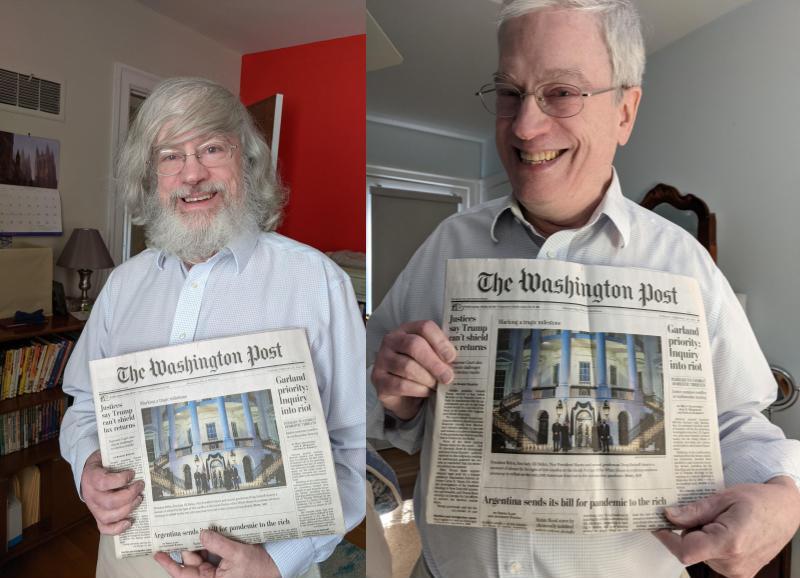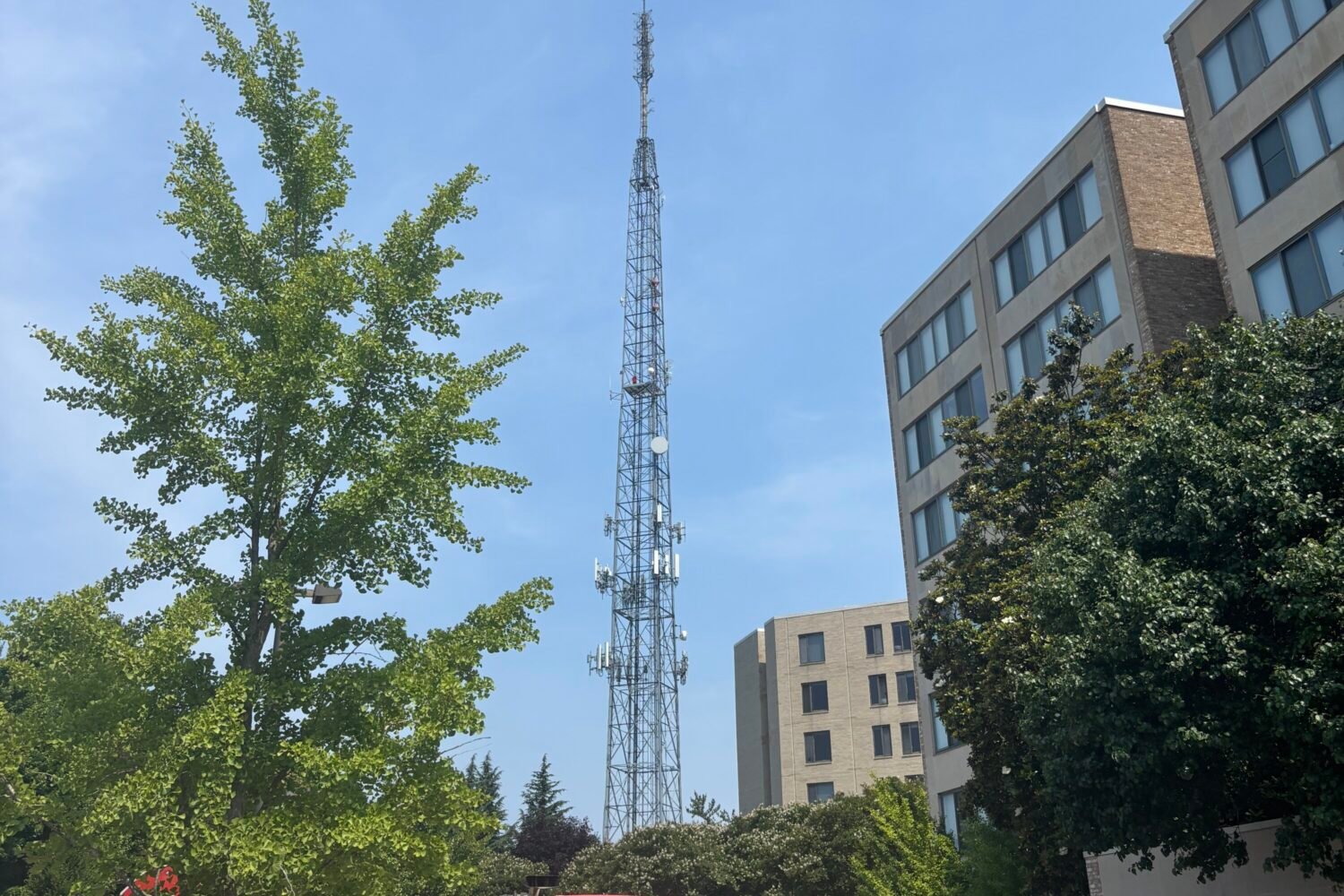The goal was $30,000. That’s how much Rob Bamberger hoped to raise during the December 5, 2020, of Hot Jazz Saturday Night, the three-hour show he hosts each week on WAMU at 7 PM. His brothers back home in Ohio had pulled together a $10,000 challenge grant for the station’s year-end membership drive with two conditions: 1) Bamberger had to raise $30,000 on his own; 2) he had to agree to get his pandemic hair and beard cut. (“I think it’s because the beard and the hair now makes me look more distinguished than they look,” Bamberger says.)
Bamberger blew past 30K in the show’s first hour. By 10 PM, Hot Jazz Saturday Night had raised $86,455, which plus his brothers’ ten grand and a donor who appreciates round numbers kicking in $3,545, ended up at an even $100,000. “The support we got from Rob’s audience that night confirmed that the enthusiasm for the show has not diminished,” says Monna Kashfi, WAMU’s chief content officer. “It’s also a testament to the contribution that Rob makes on a weekly basis to preserving and celebrating the rich history and legacy of jazz music.”
In fact, bringing back Bamberger’s show was one of Kashfi’s first decisions once she became content honcho at the public radio station last year. Hot Jazz Saturday Night began broadcasting in 1980 before WAMU suddenly yanked it in June 2018, outraging a loyal audience for whom a weekend night wasn’t complete without Bamberger, say, plucking gems from Bix Beiderbecke and Frankie Trumbauer’s time with Gene Goldkette’s orchestra and explaining what made each track special.
Bamberger got his haircut Tuesday by Aaron “AC” Claxton at the Shop Salon’s Union Market location. Washingtonian sat down with the suddenly less hirsute local radio fixture to ask him about his time away from the air, and how he’s getting through the pandemic.
Washingtonian: Rob, tell me about your time away from WAMU. You were off the air a good two years and change.
Rob Bamberger: Well, I was able to spend more time with my wife, Chris. And it was a delight to discover that we both enjoyed that a great deal. Having been doing the show weekly, for nearly 38 years, I really had lost any sense of just how much investment of time and work was involved in its production, week after week. But there were times during that period where I found myself listening less often to music, which was saddening and disturbing. I put the shows together in the basement of our home. And I would sit down here and my eyes would cast around looking at the records and my reference library, and I would just say to myself, What’s the point of all this? It had lost something of a reason for being because I wasn’t sharing it beyond doing some additional broadcasts for WOWD In Takoma Park, a wonderful community radio station. But beyond that, the collection was going unshared. And I even began to wonder if the time was coming when I should somehow think about disposing of it sometime in the foreseeable future.
As awful a thought as it is for you to consider getting rid of your record collection, I can totally understand that. They remind you of what you’ve lost.
Well, there’s that. There’s also something that my good friend and colleague Dick Spotswood once said that I never ever forgot. He had his records down in his basement. He sold his collection to a gentleman named Robert Altshuler, who was essentially a collector of collections. And I said to Dick, how can you? How can you let this go? Well, he says, You wake up one morning, and you realize instead of you keeping the collection, the collection is keeping you. And I crossed that line some some time ago. And so without a purpose for it, that that began to just kind of come up in, in my thinking
My wife scheduled time to listen to your Ella Fitzgerald show over the holidays. She generally doesn’t schedule things on the weekend. But she didn’t want to miss learning about how Ella Fitzgerald got her first big break and got famous. You know, there’s almost no barriers now between someone who wants to hear Ella Fitzgerald and her music, but it’s difficult to dig beyond “essentials” playlists or greatest hits. It’s almost a tyranny of accessibility.
I like the way you express that. I think sometimes people think of music shows as someone being a disc jockey who’s essentially just queuing something up and and letting it run. I think of myself and Hot Jazz Saturday Night as a program that has public radio values. I’m a producer slash host and a curator, and not just someone who spins records. That’s lovely what you told me about about your your wife, and it’s reminiscent of something that we say so often during membership campaign to remind listeners of how often they consider programming on WAMU to be appointment listening.
When I was preparing for this interview, I looked at your 2018 Facebook post that announced the show would end, and I was surprised to see so many comments from people I knew from the punk and indie rock scenes who were upset about it.
That’s terrific. In a way, it’s not surprising. I really think that there is—I don’t know whether tolerance is the right word, but more capacity in the breadth of our tastes than we imagined. But because we don’t always have access to things we don’t know about, We don’t get to exercise these other pockets of [music] that would test the breadth of our tastes, and interests. Which is a point for having music out there where people can find it. Sometimes people would meet me and make some comments assuming that I was not a fan of bluegrass. And I would look at them and say, I live in a glass house. I throw no stones at any kind of music. Music is the priesthood of the believer. I don’t quite subscribe to that cliché that there’s only good music and bad music. I first entertain the notion that what I might have once imagined as bad music is music that I just haven’t had an opportunity to come to understand yet.
That’s why that’s why my collection even has Ornette Coleman in it, because I have his complete Atlantic recordings. And and he did a track sort of an homage to Sydney Bechet. But I’d really like to understand Ornette Coleman better, and I hope someday I’ll have time to sit down and and immerse myself for half a day or something in Ornette Coleman and come away with some handle on on the importance and significance.
How much time do you spend preparing for the show every week?
Each hour of produced show has somewhere between four to five hours of prep behind it. And it’s very hard to explain to people exactly what takes so long. But this morning, for example, I’ve been working on a set of titles from a CD on the Rivermont label, it’s the second volume of ragtime music that was commissioned from a bunch of ragtime pianists and composers, were each asked to write a rag. So I’m thinking about how to contextualize it, but then choosing which tracks to play, but also how to sequence from. And so I will go back and forth, previewing, auditioning, and then trying to figure out the best way to sequence them to engage the ear and to please the ear. Assembling the set means identifying the right records to pull together: Looking up the arrangers and soloists, finding copies of them in in my collection, or sending an SOS out to a collector to to see if they can help out. And then assembling it and writing up some notes to contextualize it. So it’s not just like going to the shelf and pulling a track.
I have to ask how many records you have.
The question you’re asking does come up. I do have an answer. It’s not a number. But it’s an answer more relevant to me as a collector. And that is, it’s really not the number of records one has, but the usefulness of the records you have. Because you can have a lot of stuff that has no particular utility to what you’re doing on the air. And I certainly know of smaller collections that I would describe as more choice or “churse,” as they might say on the streets of New York. So I just don’t know, but you could say that it takes up the entire basement and threatens to go up the stairs.



















